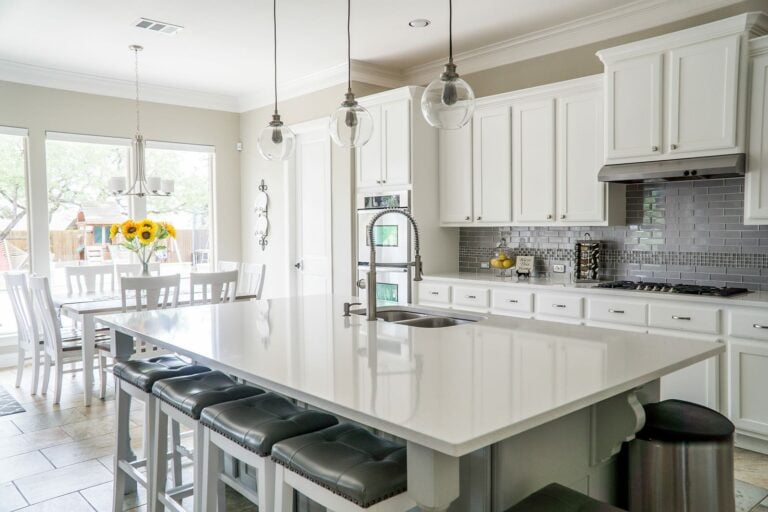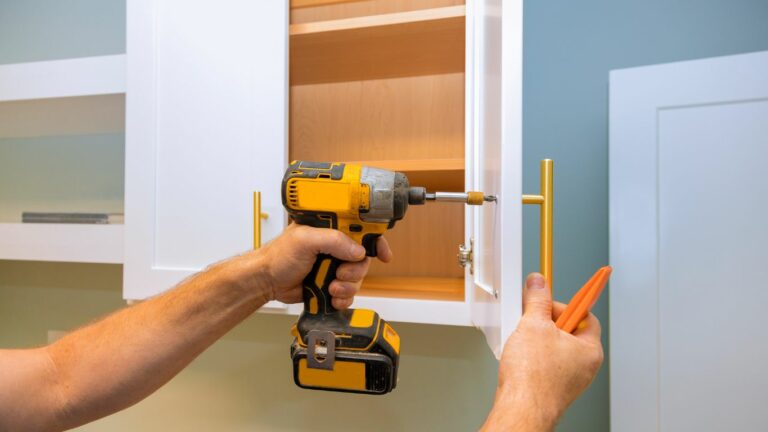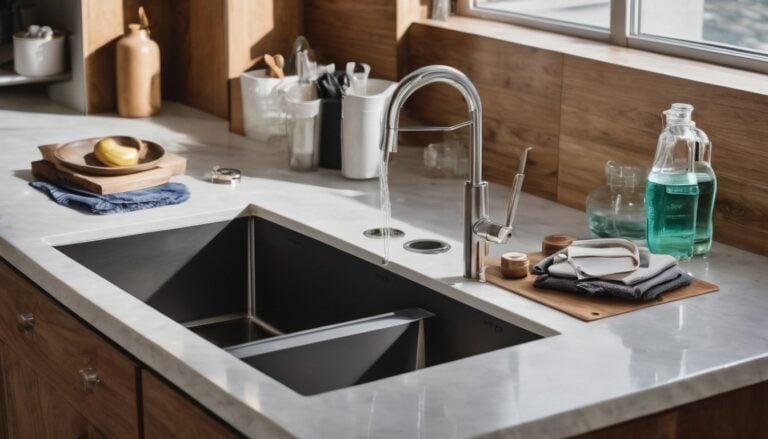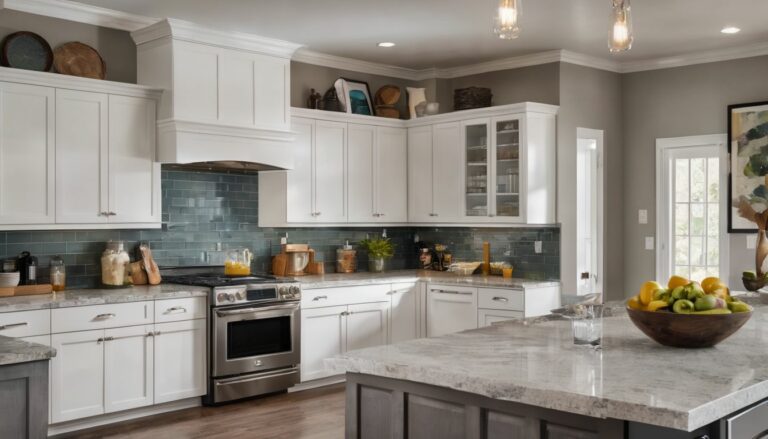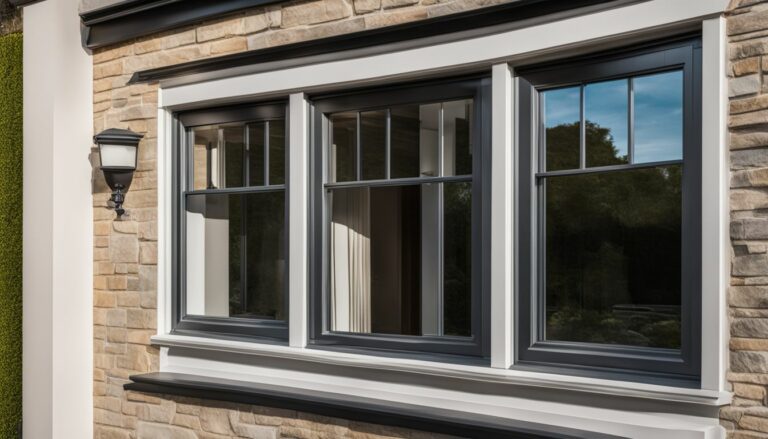Can You Cut on Quartz Countertops? Get Expert Advice
I have to say, as someone who has owned and worked with quartz countertops for years, I am constantly amazed by their beauty and durability. When it comes to choosing a countertop material, quartz is always at the top of my list.
Not only do these natural stone countertops add a touch of elegance to any kitchen, but they are also incredibly tough and resistant to scratches. Over the years, one question that I have always been asked is: “can you cut on quartz countertops?”
In this article, we will whether cutting on a quartz countertops is a good idea or not. We will also explore the importance of using cutting boards to prevent staining or scratching your quartz countertop. I will give you tips to prevent scratches and damages in order to maintain cleanliness and extend the life span of your quartz countertops significantly.
Is it Safe to Cut on Quartz Countertops

Despite all the complements my kitchen has gotten because of my quartz countertop due to its aesthetic and luxury look, almost every who has seen it often ask me was whether it’s safe to cut directly on quartz stone counters and if you reading this, chances are you might have the same question.
The short answer is while quartz counters are known for their durability and resistance to scratches, making them a popular choice for kitchen countertops. I still recommend to using a cutting board to maintain the shine and protect the surface. So, trust me when I say that taking a few extra precautions will go a long way in keeping your quartz countertops looking brand new.
You will learn how to choose the best quartz countertops from numerous options out there, as well as the best cutting board and the best knives for the job to help you scale your cooking endeavors without any damage. Whether you’re a home cook or a professional chef, these insights will help you navigate the world of quartz countertops with confidence.
So, if you’ve ever wondered about the do’s and don’ts of cutting on quartz countertops, buckle up as we unveil everything you need to know.
Can You Cut Food Directly on Quartz Countertops?

Scratching and Damage
Cutting food directly on quartz countertops can cause scratches and damage to the surface. While quartz is a durable material, it is not as resistant to scratching as granite or other natural stones on kitchen countertops. The hardness of quartz falls at around 7 on the Mohs scale, which makes it quite sturdy. However, it is still susceptible to scratches if enough force is applied.
Protecting Your Countertop
To protect your quartz countertop from knife marks and potential damage, it is highly recommended to use cutting boards when preparing food items. Using a cutting board provides an extra layer of protection between your knives and the countertop surface. It ensures that any sharp objects do not come into direct contact with the quartz material.
Why Use Cutting Boards?
There are several reasons why using cutting boards is essential for maintaining the quality of your quartz countertop:
- Prevents Scratches: Cutting boards act as a barrier between the sharp edge of knives and the countertop surface, preventing scratches and gouges.
- Avoids Staining: Certain foods, such as acidic fruits or raw meat, may leave stains or discoloration on your countertop if they come into direct contact with it.
- Reduces Bacterial Contamination: Using a cutting board helps minimize the risk of bacteria transferring from raw meat or other food items onto your countertop.
- Easy Cleanup: Cutting boards are easy to clean and sanitize after use, ensuring a hygienic food preparation area in your kitchen.
Additional Tips
Here are some additional tips to keep in mind when working with quartz countertops:
- Use stainless steel knives instead of ceramic ones, as they are less likely to cause scratches.
- Avoid applying excessive force when slicing or chopping ingredients on the countertop surface.
- Clean up spills promptly to prevent any potential staining or damage.
- Consider using a trivet or hot pad when placing hot pots or pans on the countertop to avoid heat damage.
- Regularly clean and maintain your quartz countertop according to the manufacturer’s instructions.
The Do’s and Don’ts of Quartz Countertop Care

Do clean spills immediately with a mild detergent and water solution.
Keeping your quartz countertops clean is essential for maintaining their beauty and longevity. When spills occur, it’s crucial to act quickly. Grab a mild detergent and mix it with water to create a gentle cleaning solution. Use a soft cloth or sponge to wipe away the spill, ensuring that no residue is left behind. By promptly addressing spills, you can prevent stains from setting in and keep your countertops looking pristine.
Don’t use abrasive cleaners or scrubbers that can scratch the surface of your quartz countertop.
While quartz countertops are known for their durability, they are not invincible. Avoid using harsh abrasive cleaners or scrubbers on the surface as they can cause scratches. Opt for non-abrasive cleaning products specifically designed for quartz surfaces instead. These gentle cleaners will effectively remove dirt and grime without compromising the integrity of your countertops.
Do use trivets or hot pads under hot cookware to prevent thermal shock.
Quartz countertops can withstand high temperatures, but sudden extreme changes in temperature can lead to thermal shock, causing cracks or discoloration. To protect your countertop from such damage, always use trivets or hot pads when placing hot cookware on its surface. These heat-resistant accessories provide an insulating barrier between the countertop and the hot item, preventing any potential harm.
Don’t cut directly on the quartz countertop surface with knives; always use a cutting board.
Although quartz is highly resistant to scratches, it’s still best practice to use a cutting board when preparing food items. Sharp knives can potentially leave marks on the surface if used directly on the countertop. By using a cutting board, you provide an extra layer of protection for your quartz countertops while also extending the lifespan of your knives by avoiding contact with hard surfaces.
Do take precautions when working with raw meat and acidic foods.
When dealing with raw meat or acidic foods, it’s important to be mindful of your quartz countertop. Raw meat can harbor bacteria that may transfer onto the surface, potentially compromising your family’s health. To prevent this, always use a cutting board and clean up any spills promptly. Similarly, acidic foods like lemon juice or vinegar can etch the quartz surface over time. Wipe up any spills immediately and avoid leaving acidic substances in contact with the countertop for extended periods.
Don’t worry about sealing your quartz countertops.
Unlike natural stone materials like granite or marble, quartz countertops do not require regular sealing. Quartz is an engineered material made from a combination of natural quartz and resin. The resin component provides excellent stain resistance, eliminating the need for sealants. This low-maintenance aspect of quartz countertops makes them a popular choice among homeowners who want both beauty and convenience in their kitchen.
Using Cutting Boards: Best Practices for Quartz Countertops

To ensure the longevity and beauty of your quartz countertop, it’s crucial to follow proper cutting board practices. Here are some tips to keep in mind when using cutting boards on your quartz surface:
Always Use a Cutting Board
When preparing food on your quartz countertop, always use a cutting board. This is essential to protect the surface from scratches and damage caused by knives. By using a cutting board, you create a barrier between the sharp edges of your knives and the delicate quartz material.
Choose the Right Material
When selecting a cutting board for your kitchen countertop, opt for materials like wood, plastic, or bamboo. These materials are gentle enough not to scratch the surface of your quartz while providing a sturdy and reliable surface for slicing and dicing. Avoid using glass or ceramic cutting boards as they can also cause scratches on your quartz countertop.
Watch Out for Hard Surfaces
While quartz countertops are known for their durability, they are not invincible against hard surfaces. Avoid placing heavy items directly onto your countertop without any protection. For instance, refrain from chopping food directly on top of your quartz surface without using a cutting board. Even though it may seem harmless at first, repeated impact over time can lead to scratches and damage.
Handle with Care
Be mindful of how much force you apply when using knives on your cutting board placed atop the quartz countertop. While quartz is highly resistant to scratching compared to other materials like granite countertops, excessive force can still cause damage. Apply enough force only to slice through food items without exerting unnecessary pressure that could potentially harm both the knife blade and the countertop.
Cleanliness Matters
Maintaining cleanliness is vital not only for keeping your countertops looking pristine but also for ensuring good hygiene in the kitchen. After each use, clean both sides of the cutting board thoroughly with warm soapy water to remove any food residue or bacteria. Avoid leaving raw meat or other acidic foods on the cutting board for an extended period, as they can potentially damage the quartz surface.
By following these best practices, you can enjoy a scratch-free and beautiful quartz countertop in your kitchen. Remember to always use a cutting board, choose the right material, handle with care, and keep your cutting boards clean to avoid any potential damage to your quartz surface.
Preventing Scratches and Damage: Tips for Quartz Countertop Care

To keep your quartz countertop looking its best, it’s essential to take preventive measures and care for it properly. Here are some tips to help you avoid scratches and damage:
Use Mats or Coasters Under Heavy Objects
Placing mats or coasters under heavy objects like pots, pans, or appliances is a simple but effective way to protect your quartz surface from scratches. The weight of these items can cause friction when dragged across the countertop, leading to unsightly marks. By using mats or coasters as a buffer, you can prevent direct contact between the hard surfaces and your countertop.
Avoid Dragging Sharp Objects
Sharp objects such as knives or utensils with pointed edges can easily scratch the surface of your quartz countertop. Instead of dragging them across the surface, make sure to lift them carefully. This small action can go a long way in preventing any potential damage.
Regularly Clean with Non-Abrasive Cleaners
Keeping your countertop clean is crucial not only for its appearance but also for its longevity. Use non-abrasive cleaners specifically designed for quartz surfaces to avoid scratching or dulling the material. These cleaners are formulated to be gentle yet effective in removing dirt, stains, and spills without causing any harm.
Use Cutting Boards
When preparing food on your quartz countertops, always use cutting boards as an extra layer of protection. While quartz is a durable material that resists scratching better than other surfaces like granite countertops, it’s still important to take precautions. Using a cutting board provides a barrier between sharp knives and the countertop surface, minimizing the risk of scratches.
Be Mindful of Hardness Scale Differences
Quartz countertops rank high on the Mohs scale of hardness, making them resistant to scratches from everyday use. However, it’s important to note that while they are tough against most materials, they can still be damaged by harder substances like diamonds or certain types of stone. Therefore, it’s best to avoid using excessive force or placing heavy objects directly on the surface.
Wipe Up Spills Immediately
Spills are an inevitable part of everyday life in the kitchen. To prevent any potential damage to your quartz countertop, make sure to wipe up spills immediately. Liquids like acidic foods or colored liquids can stain the surface if left for too long. By addressing spills promptly, you can maintain the pristine appearance of your countertop and prevent any lasting damage.
Taking care of your quartz countertop doesn’t have to be a daunting task. By following these simple tips and incorporating them into your daily routine, you can ensure that your countertop remains scratch-free and looking its best for years to come.
Understanding the Durability of Quartz Countertops

Quartz countertops are a popular choice for kitchens due to their exceptional durability. These engineered stone surfaces are created by combining natural quartz with resins and pigments, resulting in a material that is highly resistant to stains, heat, impact, and scratches.
Compared to other countertop materials like granite or stainless steel, quartz countertops offer superior hardness and resilience. They are designed to withstand the daily wear and tear of a busy kitchen while maintaining their beauty for years to come.
One of the key reasons why quartz countertops are so durable is because of the resin used in their manufacturing process. The resin acts as a binding agent, holding the quartz particles together and making them less prone to cracking or chipping. This added strength makes quartz countertops an excellent choice for families who spend a lot of time in the kitchen.
Many people wonder if it’s safe to use knives directly on the surface without causing damage. The answer depends on various factors such as the force applied and the type of knife being used. While quartz is highly scratch-resistant, it is not completely scratch-proof. Using sharp knives directly on the surface can potentially leave marks over time.
To avoid scratching your quartz countertop while cutting food items, it’s best practice to use a cutting board as an extra layer of protection. A cutting board provides a barrier between your knives and the countertop surface, reducing the risk of scratches significantly. Using a cutting board helps maintain hygiene by preventing cross-contamination from raw meat or other bacteria-laden food items.
It’s important to note that acidic foods can also potentially damage your quartz surface if left in contact for extended periods. Foods like lemons or vinegar can etch into the surface and cause dull spots or discoloration over time. T
o prevent this, it’s advisable to wipe up spills promptly and avoid placing acidic food items directly on the countertop. Using trivets or coasters for hot pans and pots is also recommended to protect the surface from heat damage.
Consult a Granite Specialist for Guidance on Cutting on Quartz

It’s essential to seek advice from a granite specialist or countertop professional. These experts have the knowledge and experience to guide you on the best practices for cutting on your specific quartz countertop brand and installation.
Consulting a specialist ensures that you receive accurate information tailored to your needs. They can provide insights into the unique characteristics of quartz countertops, such as their hardness and durability. By understanding these factors, you can make informed decisions about how to handle and care for your countertops.
Here are some reasons why consulting a granite specialist is crucial when it comes to cutting on quartz countertops:
Expert guidance based on your specific quartz countertop brand and installation

A granite specialist or countertop professional has in-depth knowledge of different brands and types of quartz countertops. They understand the variations in composition, hardness levels, and maintenance requirements. By consulting them, you can gain valuable insights into the specific characteristics of your countertop material.
Accurate information tailored to your needs
Every kitchen is unique, with different cooking habits, family dynamics, and usage patterns. A granite specialist takes all these factors into account when providing guidance on cutting on quartz countertops. They consider your lifestyle, the type of food items you prepare regularly, and any potential risks associated with certain cutting techniques.
Preventing scratches and damage
Quartz is known for its durability; however, it is not entirely impervious to scratches or damage caused by improper cutting techniques. A granite specialist can advise you on using appropriate cutting boards made from materials that won’t scratch or damage the surface of your quartz countertop.
Maintaining hygiene and cleanliness
Cutting raw meat or acidic foods directly on a quartz surface may lead to staining or etching over time. A granite specialist can recommend proper cleaning methods after slicing raw meat or working with highly acidic ingredients. They can also provide guidance on how to seal your countertop regularly to prevent staining and maintain its pristine appearance.
Ensuring food safety
Quartz countertops are non-porous, which means they are less likely to harbor bacteria compared to other materials. However, it’s still crucial to follow proper food safety practices when cutting on your countertop. A granite specialist can advise you on the best practices for cleaning and sanitizing your quartz surface after handling raw meat or other potentially contaminated food items.
Is It a Good Idea to Cut Directly on Quartz?

It’s important to consider how you use and treat the surface. Cutting directly on quartz countertops is not recommended due to the risk of scratches and damage. Instead, using cutting boards provides an extra layer of protection, preserving the longevity and shine of your quartz surface.
Preserving Your Quartz Countertop
Quartz countertops are known for their durability and resistance to stains, but they are not invincible. The hardness of quartz falls at around 7 on the Mohs scale, making it one of the hardest materials used in kitchen countertops. However, even with its impressive hardness, enough force from knives or other sharp objects can still cause scratches on the surface.
By using cutting boards when preparing food items on your quartz countertop, you minimize the risk of scratching or damaging the surface. Cutting boards act as a barrier between your knives and the countertop, preventing direct contact that could lead to unsightly marks or potential long-term damage.
Extending Lifespan and Maintaining Hygiene
Following this practice of using cutting boards will help extend the lifespan of your quartz surface. By avoiding direct cutting on your countertop, you prevent unnecessary wear and tear that can occur over time. This means fewer repairs or replacements down the line, saving you both time and money.
In addition to protecting against physical damage, using cutting boards also helps maintain hygiene in your kitchen. Raw meat contains bacteria that can seep into small cracks or scratches on a countertop surface if not properly cleaned. By utilizing a cutting board dedicated solely to raw meat preparation, you reduce the risk of cross-contamination and potential health hazards.
Comparing Quartz with Other Countertop Materials
While granite countertops share similar characteristics with quartz in terms of hardness and durability, it is still advisable to use cutting boards for both materials. Granite, like quartz, can also be scratched if enough force is applied with a knife or other sharp object. Therefore, regardless of the countertop material you have in your kitchen, using cutting boards is a good practice to protect your investment.
In contrast, softer materials such as marble may be more prone to scratching and damage from direct cutting. It is especially important to use cutting boards on these surfaces to prevent any potential harm.
Conclusion: Best Practices for Cutting on Quartz Countertops

Congratulations! You are now equipped with the knowledge to confidently handle your quartz countertops. By following these best practices, you can ensure the longevity and beauty of your investment. Remember, always use a cutting board when preparing food on your quartz countertop. This simple step will prevent scratches and maintain the pristine surface.
To further protect your countertop, consider investing in high-quality cutting boards made from materials like bamboo or plastic. These boards not only provide a safe surface for cutting but also add a touch of style to your kitchen. By implementing these practices, you can enjoy both functionality and aesthetics in your culinary space.
So go ahead, unleash your inner chef without worrying about damaging your quartz countertops. With proper care and attention, they will continue to shine for years to come!
FAQs
Can I place hot pots and pans directly on my quartz countertop?
No, it is not recommended to place hot pots and pans directly on quartz countertops. While quartz is heat resistant, sudden extreme temperature changes can cause thermal shock and potentially damage the surface. Always use trivets or hot pads to protect your countertop from heat.
How do I remove stubborn stains from my quartz countertop?
For stubborn stains on quartz countertops, create a paste using water and a mild detergent or non-abrasive cleaner. Apply the paste to the stain and gently scrub with a soft cloth or sponge. Rinse thoroughly with water afterward.
Can I cut meat directly on my quartz countertop?
It is best to avoid cutting meat directly on your quartz countertop as raw meat can harbor bacteria that may seep into any scratches or cuts on the surface. Use a cutting board specifically designated for meats to ensure proper hygiene.
Are there any cleaning products I should avoid when cleaning my quartz countertop?
Yes, you should avoid using harsh chemicals such as bleach, abrasive cleaners, or any product containing acidic substances like vinegar or lemon juice. These can damage the surface of your quartz countertop. Stick to mild detergents or specialized quartz cleaners for routine cleaning.
Can I place heavy objects on my quartz countertop?
Quartz countertops are known for their durability and strength, but it is still advisable to avoid placing excessive weight on them. While they can withstand normal kitchen activities, using additional support like brackets for heavy objects is recommended to prevent any potential damage over time.


